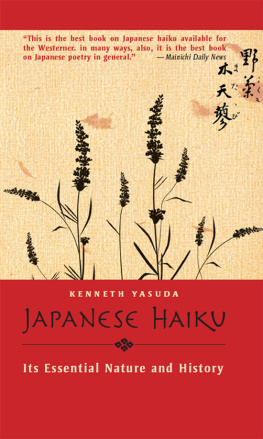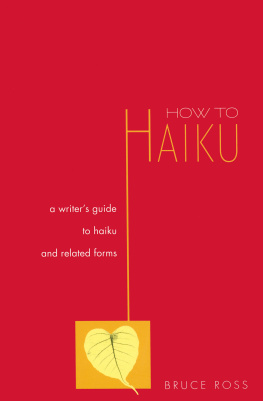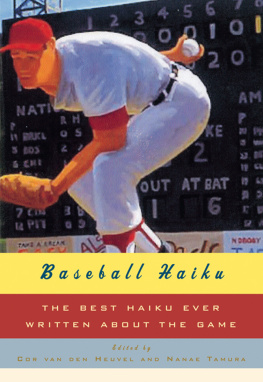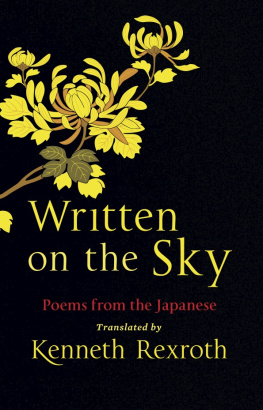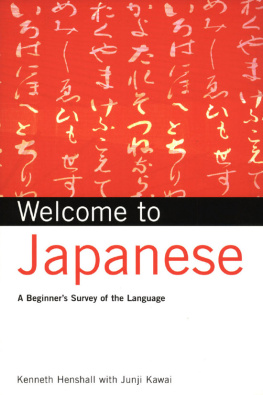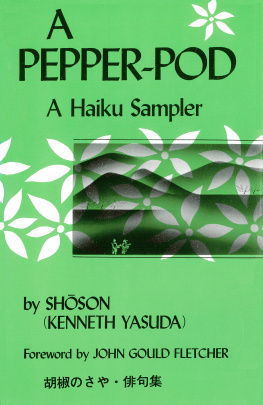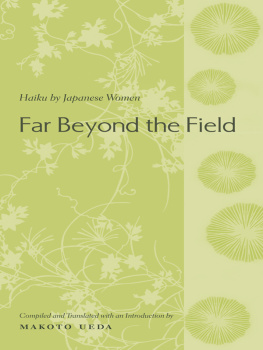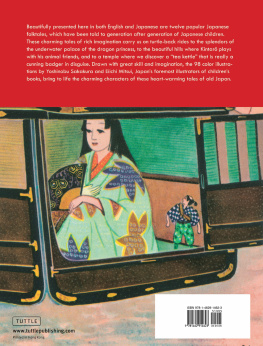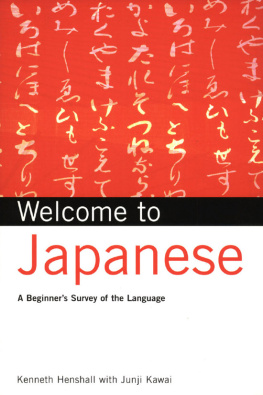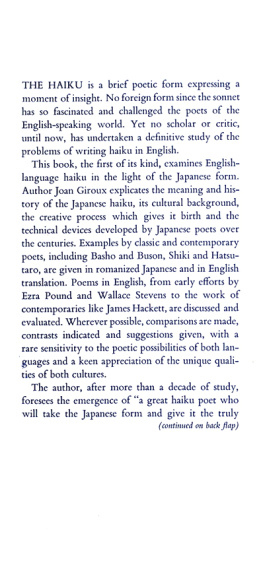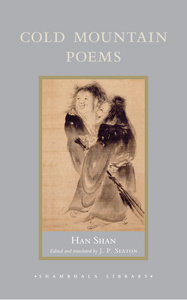Kenneth Yasuda - Japanese Haiku
Here you can read online Kenneth Yasuda - Japanese Haiku full text of the book (entire story) in english for free. Download pdf and epub, get meaning, cover and reviews about this ebook. year: 2012, publisher: Tuttle Publishing, genre: Science. Description of the work, (preface) as well as reviews are available. Best literature library LitArk.com created for fans of good reading and offers a wide selection of genres:
Romance novel
Science fiction
Adventure
Detective
Science
History
Home and family
Prose
Art
Politics
Computer
Non-fiction
Religion
Business
Children
Humor
Choose a favorite category and find really read worthwhile books. Enjoy immersion in the world of imagination, feel the emotions of the characters or learn something new for yourself, make an fascinating discovery.
- Book:Japanese Haiku
- Author:
- Publisher:Tuttle Publishing
- Genre:
- Year:2012
- Rating:5 / 5
- Favourites:Add to favourites
- Your mark:
- 100
- 1
- 2
- 3
- 4
- 5
Japanese Haiku: summary, description and annotation
We offer to read an annotation, description, summary or preface (depends on what the author of the book "Japanese Haiku" wrote himself). If you haven't found the necessary information about the book — write in the comments, we will try to find it.
Japanese Haiku — read online for free the complete book (whole text) full work
Below is the text of the book, divided by pages. System saving the place of the last page read, allows you to conveniently read the book "Japanese Haiku" online for free, without having to search again every time where you left off. Put a bookmark, and you can go to the page where you finished reading at any time.
Font size:
Interval:
Bookmark:
T HIS BOOK WAS originally submitted to Tokyo University as a doctoral thesis in 1955 under the title On the Essential Nature and Poetic Intent of Haiku . It represents a formal presentation of materiala part of which first appeared in the introduction to my collection of haiku, A Pepper Pod that is the culmination of an interest in haiku dating from many years ago.
I am very deeply indebted to many people for encouraging me to pursue that interest and for their help in clarifying my thinking and poetic practice. Among them are Masao Kume and Kyoshi Takahama in Japan; John Gould Fletcher, Clark Ashton Smith, Babette Deutsch, Mark Van Doren, and George Savage in America. Among Japanese scholars, I should like to acknowledge the great help received from Dr. Yutaka Tatsuno, Dr. Senichi Hisamatsu, and Dr. Isoji As, the latter two of whom were kind enough to read the original outline and offer many valuable suggestions; from Dr. Shigeru Nambara, Dr. Shintaro Suzuki, Dr. Naoshiro Tsuji, Dr. Takeshi Sait and Mr. Kinichi Ishikawa, whose heartening encouragement was so generously given. Thanks are also due to Dr. Robert B. Hall for his kind foreword and thoughtful suggestions, and to Mr. Noboru Takahashi for his help in proofreading and with the many troublesome details connected with the actual publication. Above all I must acknowledge the most fundamental debt of all to the late Archbishop Seiken Okano and Bishop Eizan Kishida.
For permission to quote from the works listed, I wish to make acknowledgment to the following: George Allen and Unwin Limited for Mysticism and Logic by Bertrand Russell and for Ariosto, Shakespeare and Corneille by Benedetto Croce; Brandt and Brandt for Dirge without Music from The Collected Lyrics of Edna St. Vincent Millay , published by Harper and Brothers; the executors of the James Joyce Estate for A Portrait of the Artist as a Young Man by James Joyce, published by Jonathan Cape Limited; Constable and Company Limited for The Poetical Works of George Meredith ; the John Day Company, Inc., for The Asian Legacy and American Life , edited by Arthur E. Christy; Faber and Faber Limited for The Use of Poetry and the Use of Criticism, Selected Essays , and Selected Prose by T. S. Eliot; Harcourt, Brace and Company for History of American Poetry by Horace Gregory and Marya Zaturenska; the Harvard University Press for Philosophy in a New Key by Suzanne K. Langer; William Heinemann Limited for The Essence of Aesthetic by Benedetto Croce; Henry Holt and Company, Inc., for The Runaway from New Hampshire by Robert Frost, copyright 1923 by Henry Holt and Company, Inc., and copyright 1951 by Robert Frost, and for Chicago from Chicago Poems by Carl Sandburg, copyright 1916 by Henry Holt and Company, Inc., and copyright 1944 by Carl Sandburg; Houghton Mifflin Company for Flame Apples from Pictures of the Floating World by Amy Lowell, and for Some Imagist Poets, edited by Amy Lowell; Intercultural Publications, Inc., for Contemporary Japanese Art, by Chisaburo F. Yamada and James Laughlin, published in Perspective of Japan, the January 1955 supplement to Atlantic Monthly; Longmans Green and Company Limited for The Psychologist Looks at Art by Louis Danz; Macmillan and Company Limited, London, for Oxford Lectures on Poetry by A. C. Bradley and for Aesthetic as a Science of Expression and General Linguistic by Benedetto Croce; Macmillan Company for Science and the Modern World by Alfred North Whitehead; John Murray Limited for Japanese Literature by Donald Keene, in their series The Wisdom of the East; New Directions for selection XXI from Spring and All I-XXVIII by William Carlos Williams; copyright 1948 and 1951 by William Carlos Williams: Open Court Publishing Company for Substance and Function and Einsteins Theory of Relativity by Ernst Cassirer; G. P. Putnams Sons for Art as Experience by John Dewey, copyright 1934; Henry Regnery Company for Achievement in American Poetry 1900-1950 by Louise Bogan; Routledge and Kegan Paul Limited for Speculations by T. E. Hulme; Charles Scribners Sons for Aesthetic Quality by Stephen Pepper and for Reactionary Essays on Poetry and Ideas by Allen Tate; The Society of Authors and Dr. John Masefield, O. M., for Sea Fever; the Stanford University Press for Imagism and the Imagists by Glenn Hughes; the State University of Iowa for Rhythmic Verse (Humanistic Study, Vol. 3, No. 2) by J. H. Scott; the University of Hawaii Press for Essays in East-West Philosophy, edited by Charles A. Moore; the University of North Carolina Press for Modern Poetry and the Tradition by Cleanth Brooks; the University of Oklahoma Press for The Heel of Elohim: Science and Values in Modern American Poetry by Hyatt Howe Waggoner, copyright 1950 by the University of Oklahoma Press; Vision Press Limited for Form in Modern Poetry by Herbert Read; Partisan Review for William Shakespeare and the Horse with Wings by George Barker; the Saturday Review for The Proper Pose of Poetry, by Archibald MacLeish; Babette Deutsch for Poetry in Our Time; Harold G. Henderson for The Bamboo Broom ; Ezra Pound for his writings.
Acknowledgments are also due to the following: Shin Asano for Haiku Zenshi no Kenky ; Isoji As for Haishumi no Hattatsu ; Taiz Ebara for Haikai Seishin no Tanky and for Haikaishi no Kenky ; Etsur Ide for Meiji Taisho Haikushi ; Chikara Igarashi for Kokka no Taisei Oyobi Hattatsu ; Masao Kume for Bikush Zuyihitsu ; Tamio Kuribayashi for Haiku to Seikatsu ; Nippon Gakujutsu Shinkokai for the Manyshu ; Asaji Nose, Kusadao Nakamura, and Isoji As for Renga, Haikai, Haiku, Senry ; Shinobu Origuchi for Origuchi Shinobu Zensh ; Seki Osuga for Otsuji Hairon-sh ; Masakazu Sasa for Rengashi Ron ; Kyoshi Takahama for Haiku no Tsukuri Kata in Arusu Fujin Ksa; Ykichi Taketa for Manysh Zenchshaku ; Yoshio Yamada for Renga Gaisetsu; Kenkichi Yamamoto for Junsui Haiku; Kiyoshi Yuyama for Nihon Shiika Inritsu Gaku.
Special thanks are due to Alfred A. Knopf, Inc., for permission to reprint selections from my book A Pepper Pod.
Finally, I should like to thank the publishers of the present book, the Charles E. Tuttle Company, for their part in making this publication possible. In all fairness to them, I should add that, in order to bring the book out as soon as possible, I myself have assumed full responsibility for the editorial style and the proofreading.
Kotaki-en, Tokyo, February 1, 1957
KENNETH YASUDA

Asano, Shin, Haiku Zenshi na Kenky (A Study of Pre-Haiku History.) Tokyo: Ch bunkan. 1939.
As , Isoji, Haishumi no Hattatsu (The Development of Haikai Taste.) 2nd ed. Tokyo: Tokyod . 1944.
Barker, George, William Shakespeare and the Horse with Wings, Partisan Review , Vol. XX, No. 4 (JulyAugust, 1953.)
Bash Haikai Ronsh , comp. and ed. by Komiya, Toyotaka and Yokozawa, Saburo (Collected Haikai Theories of Bash .) 3rd ed. Tokyo: Iwanami. 1951. (All quotations from this volume given in the foregoing text are followed by the name of the original works in which they appeared.) Bash Haikushu , comp. and ed. by Ebara, Taiz (Collected Haiku of Bash .) 18th ed. Tokyo: Iwanami. 1953. (Cited below.)
Bash Kza , comp. and ed. by Ebara, Taiz and Kat , Sh son (Lectures on Bash .) 10 vols. Tokyo: Sansh d . 1943. (Cited below.)
Bogan, Louise, Achievement in American Poetry . Chicago: Henry Regnery Co. 1951.
Bradley, A.C., Oxford Lectures on Poetry . London: Macmillan. 1909.
Brooks, Cleanth, Modern Poetry and the Tradition . Chapel Hill: Univ. of North Carolina Press. 1939.
Cassagne, Albert, La Theorie de lArt pour lArt en France . Paris: Hachette. 1906.
Cassirer, Ernst, Substance and Function and Einsteins Theory of Relativity . Trans. by W. C. and M. C. Swabey. Chicago-London: Open Court. 1923.
Font size:
Interval:
Bookmark:
Similar books «Japanese Haiku»
Look at similar books to Japanese Haiku. We have selected literature similar in name and meaning in the hope of providing readers with more options to find new, interesting, not yet read works.
Discussion, reviews of the book Japanese Haiku and just readers' own opinions. Leave your comments, write what you think about the work, its meaning or the main characters. Specify what exactly you liked and what you didn't like, and why you think so.

